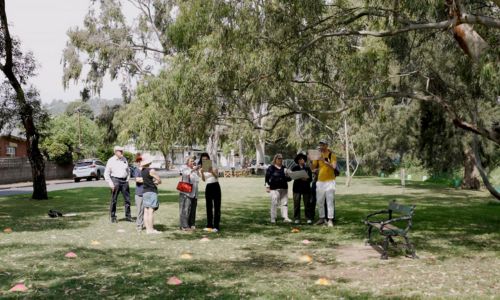
As cities worldwide experience demographic shifts with ageing societies and rapid urbanisation, the need for age-friendly design in urban communities is becoming ever more critical.
Since 2022, the University of South Australia has partnered with older residents as co-researchers, industry partner City of Unley, and South Australia’s Office for Ageing Well as a policy connector, to respond to the growing global challenges of ageing populations living in expanding urbanised spaces.
One challenge is access to quality public green spaces – imperative to support the physical, mental, and social wellbeing of older people.
A key aim of this study is to trial a range of engagement approaches with older residents as ‘citizen scientists’ and ‘co-designers’, to better understand their role in co-creating age-friendly neighbourhood green spaces.
In Stage One, 31 older residents from the City of Unley worked as citizen scientists, using an age-friendly evaluation tool on their smart phones or as a booklet, to audit the neighbourhood green spaces they use daily. This built local knowledge on how and when these spaces are used by older residents and what park features they consider age-friendly and important.
Park audits allowed citizen scientists to respond to questions about different things such as shade, paths, seating, while also highlighting possible improvements.
Through the audit tool they were able to upload photos and geocodes, with date and time stamps of their location, allowing the research team and citizen scientists to compare the green space audits.
In six months, citizen scientists completed 350 audits, covering 51 green spaces across the City of Unley.
In Stage Two, 24 co-designers, in teams of three each, took a different co-design approach (traditional 2D plan, Virtual Reality or Augmented Reality) to redesign a selected City of Unley green space to be more age-friendly.
They took part in co-design workshops and presented their final designs to residents, City of Unley staff, and representatives from Office for Ageing Well.
Analysis is currently underway and will compare final design outputs and co-design processes and approaches.
Study findings aim to provide ‘best practice’ solutions for government and non-government sectors to develop guidelines to maximise the potential of high levels of citizen engagement for better outcomes.
They will also inform 1,445 participating members of the WHO Age Friendly Cities and Communities network on implementing a rights-based participatory approach to design.
By developing a deeper understanding of the way older people engage with various approaches and technologies in landscape design, the study will provide key principles for the design of age-friendly public green spaces.
For more information, watch the video Models of Co-Design for Creating Age-friendly Public Green Spaces in Urban Neighbourhoods.


